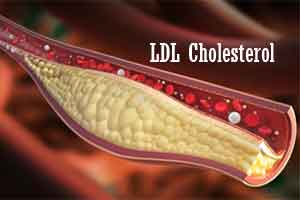- Home
- Editorial
- News
- Practice Guidelines
- Anesthesiology Guidelines
- Cancer Guidelines
- Cardiac Sciences Guidelines
- Critical Care Guidelines
- Dentistry Guidelines
- Dermatology Guidelines
- Diabetes and Endo Guidelines
- Diagnostics Guidelines
- ENT Guidelines
- Featured Practice Guidelines
- Gastroenterology Guidelines
- Geriatrics Guidelines
- Medicine Guidelines
- Nephrology Guidelines
- Neurosciences Guidelines
- Obs and Gynae Guidelines
- Ophthalmology Guidelines
- Orthopaedics Guidelines
- Paediatrics Guidelines
- Psychiatry Guidelines
- Pulmonology Guidelines
- Radiology Guidelines
- Surgery Guidelines
- Urology Guidelines
Is very low LDL-Cholesterol level safe- Check it out

Low-density Lipoprotein Cholesterol (LDL-C) is a known risk factor for cardiovascular diseases and there is sufficient evidence that supports a linear association between LDL-C levels and CV risk. However, whether the lower limit of LDL-C might offer CV benefits without any safety concerns is still a topic of debate.
A high blood cholesterol level increases your risk of coronary artery disease. Lower cholesterol is usually better, but in rare cases having a very low level of low-density lipoprotein (LDL, or "bad") cholesterol or a very low total cholesterol level has been associated with some health problems. There is no consensus on how to define very low LDL cholesterol, but LDL would be considered very low if it is less than 40 milligrams per deciliter of blood.
A review appearing in Journal Current Pharmaceutical Design discusses data from studies of several safety events that have been associated with low LDL-C levels achieved with major lipid-lowering drug.
Commonly with the use of a combination of statins with ezetimibe or proprotein convertase subtilisin kexin 9 inhibitors, several large trials have evaluated the safety or reducing LDL-C to levels lower than 50 mg/dl or even lower than 25 mg/dl. Most of the trials showed CV benefits which were observed with LDL-C levels of 50 mg/dl or less compared with higher levels. Favorable results for LDL-C levels lower than 25 mg/dl are limited.
Of importance, cancer and hemorrhagic stroke incidences were not increased in patients attaining LDL-C lower than 40-50 mg/dl. In terms of safety, the reduction of LDL-C to such levels was not associated with any significant adverse event. Data regarding the impact of lowering LDL-C with neurocognitive disorders are contradictory; nevertheless, most studies stand in favor of neurocognitive safety with LDL-C reductions to low levels.
The researchers concluded that achieving an LDL-C of 40-50 mg/dl seems to be safe, and importantly might offer CV beneficial effects. Data for attaining levels below 25 mg/dl is limited, however in favour of such reductions.
For more details click on the link: http://dx.

Disclaimer: This site is primarily intended for healthcare professionals. Any content/information on this website does not replace the advice of medical and/or health professionals and should not be construed as medical/diagnostic advice/endorsement or prescription. Use of this site is subject to our terms of use, privacy policy, advertisement policy. © 2020 Minerva Medical Treatment Pvt Ltd